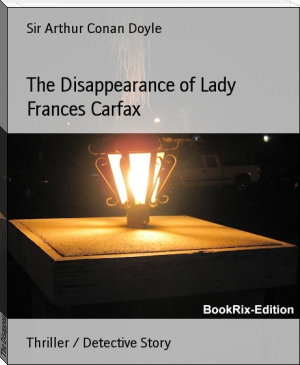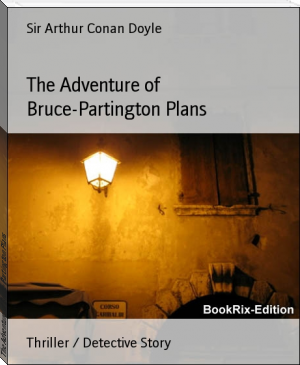His Last Bow - Arthur Conan Doyle (classic books for 12 year olds txt) 📗

- Author: Arthur Conan Doyle
- Performer: -
Book online «His Last Bow - Arthur Conan Doyle (classic books for 12 year olds txt) 📗». Author Arthur Conan Doyle
and the brightness of his dark eyes showed that they shared a
common emotion.
“Shall I speak or you?” he asked of the vicar.
“Well, as you seem to have made the discovery, whatever it may
be, and the vicar to have had it second-hand, perhaps you had
better do the speaking,” said Holmes.
I glanced at the hastily clad clergyman, with the formally
dressed lodger seated beside him, and was amused at the surprise
which Holmes’s simple deduction had brought to their faces.
“Perhaps I had best say a few words first,” said the vicar, “and
then you can judge if you will listen to the details from Mr.
Tregennis, or whether we should not hasten at once to the scene
of this mysterious affair. I may explain, then, that our friend
here spent last evening in the company of his two brothers, Owen
and George, and of his sister Brenda, at their house of
Tredannick Wartha, which is near the old stone cross upon the
moor. He left them shortly after ten o’clock, playing cards
round the dining-room table, in excellent health and spirits.
This morning, being an early riser, he walked in that direction
before breakfast and was overtaken by the carriage of Dr.
Richards, who explained that he had just been sent for on a most
urgent call to Tredannick Wartha. Mr. Mortimer Tregennis
naturally went with him. When he arrived at Tredannick Wartha he
found an extraordinary state of things. His two brothers and his
sister were seated round the table exactly as he had left them,
the cards still spread in front of them and the candles burned
down to their sockets. The sister lay back stone-dead in her
chair, while the two brothers sat on each side of her laughing,
shouting, and singing, the senses stricken clean out of them.
All three of them, the dead woman and the two demented men,
retained upon their faces an expression of the utmost horror—a
convulsion of terror which was dreadful to look upon. There was
no sign of the presence of anyone in the house, except Mrs.
Porter, the old cook and housekeeper, who declared that she had
slept deeply and heard no sound during the night. Nothing had
been stolen or disarranged, and there is absolutely no
explanation of what the horror can be which has frightened a
woman to death and two strong men out of their senses. There is
the situation, Mr. Holmes, in a nutshell, and if you can help us
to clear it up you will have done a great work.”
I had hoped that in some way I could coax my companion back into
the quiet which had been the object of our journey; but one
glance at his intense face and contracted eyebrows told me how
vain was now the expectation. He sat for some little time in
silence, absorbed in the strange drama which had broken in upon
our peace.
“I will look into this matter,” he said at last. “On the face of
it, it would appear to be a case of a very exceptional nature.
Have you been there yourself, Mr. Roundhay?”
“No, Mr. Holmes. Mr. Tregennis brought back the account to the
vicarage, and I at once hurried over with him to consult you.”
“How far is it to the house where this singular tragedy
occurred?”
“About a mile inland.”
“Then we shall walk over together. But before we start I must
ask you a few questions, Mr. Mortimer Tregennis.”
The other had been silent all this time, but I had observed that
his more controlled excitement was even greater than the
obtrusive emotion of the clergyman. He sat with a pale, drawn
face, his anxious gaze fixed upon Holmes, and his thin hands
clasped convulsively together. His pale lips quivered as he
listened to the dreadful experience which had befallen his
family, and his dark eyes seemed to reflect something of the
horror of the scene.
“Ask what you like, Mr. Holmes,” said he eagerly. “It is a bad
thing to speak of, but I will answer you the truth.”
“Tell me about last night.”
“Well, Mr. Holmes, I supped there, as the vicar has said, and my
elder brother George proposed a game of whist afterwards. We sat
down about nine o’clock. It was a quarter-past ten when I moved
to go. I left them all round the table, as merry as could be.”
“Who let you out?”
“Mrs. Porter had gone to bed, so I let myself out. I shut the
hall door behind me. The window of the room in which they sat
was closed, but the blind was not drawn down. There was no
change in door or window this morning, or any reason to think
that any stranger had been to the house. Yet there they sat,
driven clean mad with terror, and Brenda lying dead of fright,
with her head hanging over the arm of the chair. I’ll never get
the sight of that room out of my mind so long as I live.”
“The facts, as you state them, are certainly most remarkable,”
said Holmes. “I take it that you have no theory yourself which
can in any way account for them?”
“It’s devilish, Mr. Holmes, devilish!” cried Mortimer Tregennis.
“It is not of this world. Something has come into that room
which has dashed the light of reason from their minds. What
human contrivance could do that?”
“I fear,” said Holmes, “that if the matter is beyond humanity it
is certainly beyond me. Yet we must exhaust all natural
explanations before we fall back upon such a theory as this. As
to yourself, Mr. Tregennis, I take it you were divided in some
way from your family, since they lived together and you had rooms
apart?”
“That is so, Mr. Holmes, though the matter is past and done with.
We were a family of tin-miners at Redruth, but we sold our
venture to a company, and so retired with enough to keep us. I
won’t deny that there was some feeling about the division of the
money and it stood between us for a time, but it was all forgiven
and forgotten, and we were the best of friends together.”
“Looking back at the evening which you spent together, does
anything stand out in your memory as throwing any possible light
upon the tragedy? Think carefully, Mr. Tregennis, for any clue
which can help me.”
“There is nothing at all, sir.”
“Your people were in their usual spirits?”
“Never better.”
“Were they nervous people? Did they ever show any apprehension
of coming danger?”
“Nothing of the kind.”
“You have nothing to add then, which could assist me?”
Mortimer Tregennis considered earnestly for a moment.
“There is one thing occurs to me,” said he at last. “As we sat
at the table my back was to the window, and my brother George, he
being my partner at cards, was facing it. I saw him once look
hard over my shoulder, so I turned round and looked also. The
blind was up and the window shut, but I could just make out the
bushes on the lawn, and it seemed to me for a moment that I saw
something moving among them. I couldn’t even say if it was man
or animal, but I just thought there was something there. When I
asked him what he was looking at, he told me that he had the same
feeling. That is all that I can say.”
“Did you not investigate?”
“No; the matter passed as unimportant.”
“You left them, then, without any premonition of evil?”
“None at all.”
“I am not clear how you came to hear the news so early this
morning.”
“I am an early riser and generally take a walk before breakfast.
This morning I had hardly started when the doctor in his carriage
overtook me. He told me that old Mrs. Porter had sent a boy down
with an urgent message. I sprang in beside him and we drove on.
When we got there we looked into that dreadful room. The candles
and the fire must have burned out hours before, and they had been
sitting there in the dark until dawn had broken. The doctor said
Brenda must have been dead at least six hours. There were no
signs of violence. She just lay across the arm of the chair with
that look on her face. George and Owen were singing snatches of
songs and gibbering like two great apes. Oh, it was awful to
see! I couldn’t stand it, and the doctor was as white as a
sheet. Indeed, he fell into a chair in a sort of faint, and we
nearly had him on our hands as well.”
“Remarkable—most remarkable!” said Holmes, rising and taking his
hat. “I think, perhaps, we had better go down to Tredannick
Wartha without further delay. I confess that I have seldom known
a case which at first sight presented a more singular problem.”
Our proceedings of that first morning did little to advance the
investigation. It was marked, however, at the outset by an
incident which left the most sinister impression upon my mind.
The approach to the spot at which the tragedy occurred is down a
narrow, winding, country lane. While we made our way along it we
heard the rattle of a carriage coming towards us and stood aside
to let it pass. As it drove by us I caught a glimpse through the
closed window of a horribly contorted, grinning face glaring out
at us. Those staring eyes and gnashing teeth flashed past us
like a dreadful vision.
“My brothers!” cried Mortimer Tregennis, white to his lips.
“They are taking them to Helston.”
We looked with horror after the black carriage, lumbering upon
its way. Then we turned our steps towards this ill-omened house
in which they had met their strange fate.
It was a large and bright dwelling, rather a villa than a
cottage, with a considerable garden which was already, in that
Cornish air, well filled with spring flowers. Towards this
garden the window of the sitting-room fronted, and from it,
according to Mortimer Tregennis, must have come that thing of
evil which had by sheer horror in a single instant blasted their
minds. Holmes walked slowly and thoughtfully among the flower-plots and along the path before we entered the porch. So
absorbed was he in his thoughts, I remember, that he stumbled
over the watering-pot, upset its contents, and deluged both our
feet and the garden path. Inside the house we were met by the
elderly Cornish housekeeper, Mrs. Porter, who, with the aid of a
young girl, looked after the wants of the family. She readily
answered all Holmes’s questions. She had heard nothing in the
night. Her employers had all been in excellent spirits lately,
and she had never known them more cheerful and prosperous. She
had fainted with horror upon entering the room in the morning and
seeing that dreadful company round the table. She had, when she
recovered, thrown open the window to let the morning air in, and
had run down to the lane, whence she sent a farm-lad for the
doctor. The lady was on her bed upstairs if we cared to see her.
It took four strong men to get the brothers into the asylum
carriage. She would not herself stay in the house another day
and was starting that very afternoon to rejoin her family at St.
Ives.
We ascended the stairs and viewed the body. Miss Brenda
Tregennis had





Comments (0)